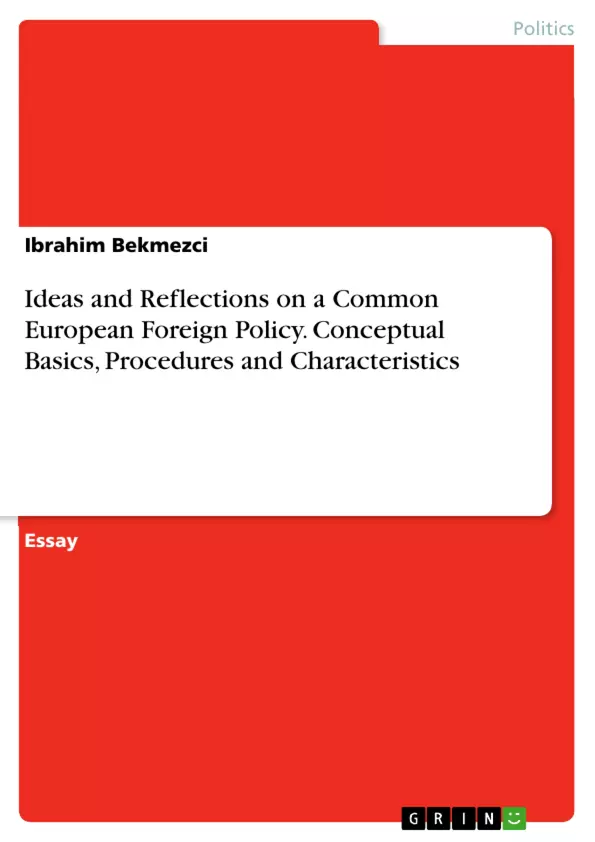This essay analyzes the role of the EU as a global actor, and focuses on the origins, causes, and strength (or absence) of the EU's foreign policy in its external relations with major regions of the world.
First, it should be articulated that the EU is a European project, namely an association of states. It has its own competencies and resources to act. The EU system is based on supra-national integration, intergovernmental cooperation, and international cooperation in a multilateral world order system. The common European foreign policy includes both individual actions, decisions, and concepts as well as an overarching pattern of relationships that form the basis of an almost mature overall strategy.
Next, it can be observed that since the end of the Cold War, the EU has gradually developed its external relations and foreign policy and has become a global player in international affairs and world politics. In the last decade, the interregionalism and multilateralism have become a key element of the external relations and foreign policy of the EU's multi-level system. In fact, the Union has quickly become the center of many interregional cooperation agreements and relationships with many regions around the world in a global framework. Promoting regional and interregional relations not only justifies and strengthens the EU's own existence and effectiveness as a global actor. The strategy also promotes the legitimacy and status of other regions and leads to a deepening of cross-sectoral interregional trade and economic ties, political dialogue, development cooperation, cultural ties, and security cooperation.
In the light of this introduction, the following key questions will be discussed and evaluated:
• What a common European foreign policy is, and how it is to be characterized,
• how the EU's foreign policy is structured, and what it is based on,
• what foreign policy powers and instruments the EU has,
• what the goals, visions, and mission of an EU's foreign policy are,
• on which theoretical concepts the EU's foreign policy is based,
• what role the EU plays as a global player in world politics.
Inhaltsverzeichnis (Table of Contents)
- Introduction.
- Conceptualizing EU Foreign Policy
- Characteristics and Ideas on an EU Foreign Policy.
- The EU's Foreign-Policy Powers and Instruments
- The EU's Foreign-Policy Goals and Activities
- The EU's Foreign-Policy Priorities .......
- Theoretical Reflections on an EU Foreign Policy..
- The Realistic Context of EU Foreign Policy.....
- The Institutional Context of EU Foreign Policy
- Further Theoretical Concepts of EU Foreign Policy
- Further Discussion and Conclusions
- Outlook: Prospects for the EU as a Global Actor in a Changing
- Conclusion......
Zielsetzung und Themenschwerpunkte (Objectives and Key Themes)
This essay examines the EU's role as a global actor, delving into the origins, causes, and effectiveness of its foreign policy in the context of its external relations with major regions of the world. It aims to analyze the characteristics, conceptual structure, and procedural aspects of a common European foreign and security policy, considering the EU's position in a shifting global order.
- The conceptualization and characteristics of EU foreign policy.
- The institutional and theoretical frameworks underpinning EU foreign policy.
- The powers, instruments, goals, and priorities of EU foreign policy.
- The EU's role as a global player in world politics.
- The challenges and opportunities faced by the EU in shaping its foreign policy.
Zusammenfassung der Kapitel (Chapter Summaries)
The first chapter introduces the concept of EU foreign policy, highlighting the uniqueness of European integration and the EU's ongoing evolution in this area. It emphasizes the multi-faceted nature of EU foreign policy, incorporating individual actions, decisions, and concepts as well as overarching relationships. The chapter concludes by outlining the key questions addressed throughout the essay.
Chapter two delves deeper into the conceptualization of EU foreign policy, recognizing the changing dynamics of international relations in the 21st century. It analyzes the multi-actor nature of international affairs in the era of globalization and examines the challenges and opportunities faced by the EU as a global player. This chapter explores the EU's growing importance in the international system and its aspirations to become a more influential actor on both domestic and global levels.
Schlüsselwörter (Keywords)
The main keywords and focus topics of this work are: EU foreign policy, common European foreign and security policy, European integration, global order, global player, international relations, multi-actor system, international cooperation, EU institutions, theoretical frameworks, foreign policy instruments, goals, and priorities, regional and interregional relations.
- Quote paper
- Ibrahim Bekmezci (Author), 2022, Ideas and Reflections on a Common European Foreign Policy. Conceptual Basics, Procedures and Characteristics, Munich, GRIN Verlag, https://www.hausarbeiten.de/document/1189165


